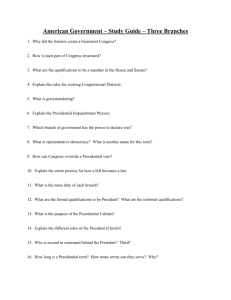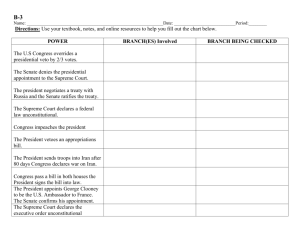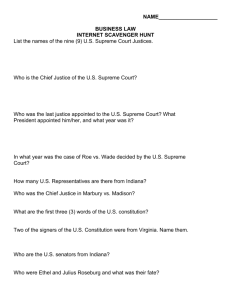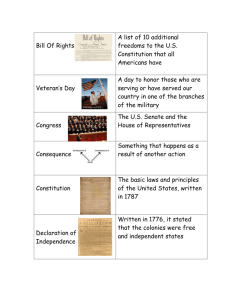Final Exam Study Guide
advertisement
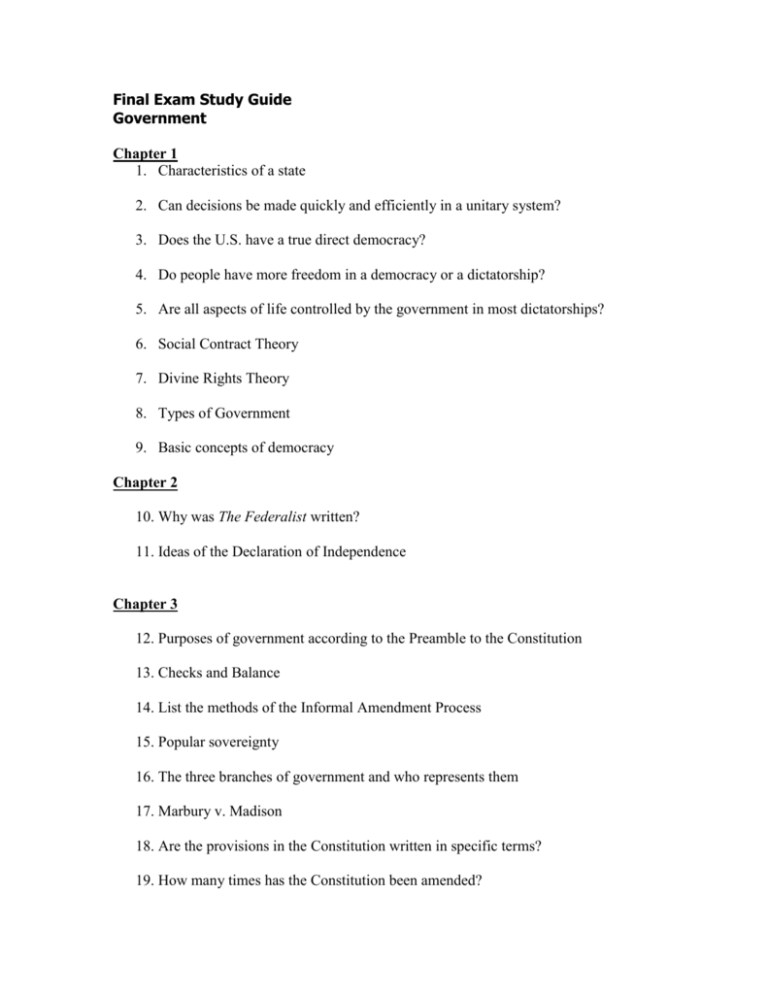
Final Exam Study Guide Government Chapter 1 1. Characteristics of a state 2. Can decisions be made quickly and efficiently in a unitary system? 3. Does the U.S. have a true direct democracy? 4. Do people have more freedom in a democracy or a dictatorship? 5. Are all aspects of life controlled by the government in most dictatorships? 6. Social Contract Theory 7. Divine Rights Theory 8. Types of Government 9. Basic concepts of democracy Chapter 2 10. Why was The Federalist written? 11. Ideas of the Declaration of Independence Chapter 3 12. Purposes of government according to the Preamble to the Constitution 13. Checks and Balance 14. List the methods of the Informal Amendment Process 15. Popular sovereignty 16. The three branches of government and who represents them 17. Marbury v. Madison 18. Are the provisions in the Constitution written in specific terms? 19. How many times has the Constitution been amended? 20. Is the power to override a veto an example of checks and balances? 21. Is judicial review an example of checks and balances? 22. What is a formal amendment? 23. What does the Bill of Rights do? 24. Do amendments have the same legality as the original Constitution? Chapter 4 25. Compact 26. Can Congress pass a nationwide divorce law? 27. Who has the power to set up public school systems? 28. What is the 10th Amendment? 29. What is the Privileges and Immunities clause? 30. Reserved powers 31. Full Faith and Credit clause 32. Nickname of the Supreme Court 33. “Supreme Law of the Land” 34. McCullough v. Maryland Chapter 5 35. Which party would be most likely to support the following issues? 36. Military spending 37. Social programs 38. Abortion 39. Gun control 40. Environment 41. Taxation of upper class 42. Labor unions 43. Affirmative action 44. Education spending and aid Chapter 10 45. How many people are in the Senate? 46. How were members of the Senate once chosen? 47. List formal qualifications of the Senate. 48. How many senators does each state get? 49. How is it decided how many Senators each state should get? 50. What are the five duties of members of Congress? 51. What does the longer term of Senate mean in regards to public pressure? 52. List the formal qualifications for the House of Representatives. 53. How many seats are currently in the House of Representatives? 54. When must Congressional elections be held? 55. How is it decided how many sets will be in the House? 56. What are the 4 ways members of Congress can vote? 57. Define bicameral 58. How are changes in population in each state dealt with in the number of House seats? 59. What is the term of the House? 60. What is the term of the Senate? Chapter 11 61. What is the process to remove a President from office? 62. How does the impeachment process work? 63. Who can be impeached? 64. Who confirms or rejects Presidential treaties and appointees? 65. Why does the Constitution have the Necessary and Proper Clause? 66. Nickname of the Necessary and Proper Clause. 67. What is eminent domain? 68. What is impeachment mean? Chapter 12 69. How can Congress overturn a presidential veto? 70. What is a private bill? 71. What is a public bill? 72. How can a bill become a law without the President’s signature? Chapter 13 73. List the formal qualifications for the presidency 74. List the first three people in the line of presidential succession (not including President) 75. How is it decided how many electors in the Electoral College each state gets? 76. What is the minimum number of electors one state can have? 77. Who chooses the President is no one receives a majority of electoral votes? 78. What is the minimum number of electoral votes to win the Presidency? 79. What role is the President performing if he orders a Navy blockade? 80. What role is the President performing if he meets with foreign leaders about world problems? 81. What role is the President performing if he urges passage of a particular bill? 82. What role is the President performing if he speaks at a party function? 83. List the Vice Presidents duties. 84. How/Why do the two major parties choose Vice Presidential candidates? 85. Who makes the rules of national conventions? 86. What is winner-take-all mean in the Electoral College? Chapter 14 87. Who approves Presidential treaties? 88. Does the President have the power to “item-veto” a bill? 89. How did the Cabinet come in to use? 90. Does Congress have to approve executive agreements? 91. How do Cabinet members get their jobs? 92. What is an Item-veto? 93. What is the name of a general pardon to a group of law violators? Chapter 18 94. Plaintiff 95. Can a Supreme Court decision be reversed? 96. Do Supreme Court decisions have to be based on a unanimous vote of the judges? 97. Do Supreme Court Judges have to have a degree in law? 98. Does the Supreme Court only use written laws to decide cases? 99. What court has both original and appellate jurisdiction? 100. What started judicial review? 101. What is dissenting opinion? 102. First step in a Supreme Court case. 103. What is appellate jurisdiction? 104. What is original jurisdiction? 105. What is exclusive jurisdiction? 106. How is the number of justices who sits on the Supreme Court decided? 107. How must a federal judge be removed form office? 108. What qualifications does the Constitution list for Supreme Court judges? Chapter 19 109. What does the Bill of Rights Guarantee? 110. Bill of Rights was constructed to restrict who? 111. Where is the Bill of Rights? 112. What is spying for another country called? 113. What is the only crime specifically defined in the Constitution? 114. What is slander? 115. What is libel? 116. Where can a full listing of the civil rights held by Americans be found? 117. What is a shield law? Chapter 20 118. Miranda Rule 119. List the rights of a person accused of a crime? 120. What does a grand jury do when it finds enough evidence to warrant a trial? 121. What things are a person guaranteed to have a fair trial? 122. What is writ of habeas corpus 123. What is double jeopardy? 124. What is the police power of the states? 125. Who are the major guardians of Civil Rights in the U.S. today? 126. Who determines the meaning of the various civil rights guarantees in the Constitution? Chapter 21 127. What are affirmative action programs aimed at? 128. What are some of the arguments of critics of affirmative action? 129. What case legalized segregation? 130. What did Brown v. Topeka Kansas Board of education do to Plessy V. Ferguson? Chapter 23 131. What is the value of a commodity based on according to the Communist Theory? 132. What economic system gives people the most incentive to work hard? 133. laissez-faire theory 134. Is individual incentive an important part of the U.S. economic system? 135. Is the American economic system purely capitalistic? 136. Does socialism believe that everyone has a right to a minimum quality of life? 137. Is the efficiency in which goods are produced an advantage of communism?
